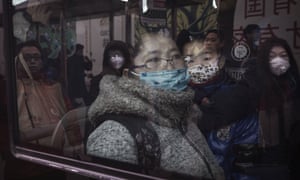In the UK, the department for environment, food and rural affairs issues daily alerts measuring air pollution levels. But when it comes to tips on how to respond, Defra confines itself to the slightly gnomic “reduce activity”.
So we asked a team of air pollution experts on the best ways to protect yourself when there’s a pollution alert in your city.
Exercise earlier – or do it indoors
The general advice, according to Frank Kelly, professor of environmental health at King’s College London is to “try to avoid exercising during a pollution episode. If you have to exercise, do so indoors.” As Ally Lewis, director of the National Centre for Atmospheric Science, points out though, the question of whether to “exercise, cycle to work or go for a run depends on the individual”. For keen runners, he says: “If you shift it to early in the morning, that would benefit anybody, because air pollution tends to build up with rush hour at about 7 or 7.30am. If you’re going to cycle to work, doing it an hour earlier, before pollution builds up, could have a significant impact on exposure.”
Pray for rain
“Particulate matter is removed primarily by rainfall,” according to Mark Jacobson, professor of Civil and Environmental Engineering at Stanford University. Don’t rush out as soon as it starts, though. “You have to wait a short while. If it’s moderate to high pollution and it starts raining, I would give it 60 minutes or so and then there’ll probably be quite a difference,” Kelly adds. If there’s wind and rain, even better.
Walk one street back
“Avoiding main arterial roads really does make a difference,” says Lewis. “Pollution drops away substantially when you’re walking one street back. If you look at the concentration gradient say, 20, 30, 40 metres away from a very congested road, it’s not like pristine air from the Atlantic but it will be two or three times less polluted. That’s a gain worth having.”
Use an app to avoid hotspots
Kelly recommends using “a travel app that gives you a lower pollution route choice”. King’s College have developed one for London and others are popping up, such as Plume, which covers more than 200 cities.

Keep the windows closed
“It would be good to not open any windows,” says Kelly. If you’ve got a well-sealed house “there won’t be much pollution coming in from outside, but you’ve got to be wary of what you produce inside that can’t escape”. Anything that involves burning produces invisible particles and gases, so …
No fires inside
If cooking with gas, use an extractor fan, preferably with a filter. “That’s something we don’t do very well at all,” says Kelly. “If it’s a cold day, it would be bad to light a fire or wood stove inside the house.”
… including candles
The other big no-no. “Scented candles are very popular but they really can shoot the particle concentrations up quite a lot indoors,” he says.
Stay informed
“Understand the extent of pollution at your location, where you live or work,” says Kelly. Conditions are always changing, so use websites such as the one his team at King’s developed, or the Department for Environment, Food and Rural Affairs. You could also see what local sensors are saying.
Eat your greens
“Always try to eat healthily, including fresh fruit and vegetables. They help maintain your body’s antioxidant reserves, which are able to reduce the effects of any pollution you are exposed to,” Kelly says.
A 2015 study he co-authored compared diets among twins, and found that “those with the best lung function were the ones who consumed more vitamin E and vitamin C”. This complements previous studies pointing to a similar effect, although the evidence isn’t conclusive. However, it’s unlikely that loading up on supplements during pollution spikes will cancel your inflammatory response to noxious particles and gas.
The complex mechanics of antioxidant benefits aren’t yet fully understood, but the data suggests “that those people on very good diets which include a lot of different nutrients, working in combination with concentrations of antioxidants, were the source of the benefit”, he adds.
Guardian Cities is dedicating a week to investigating one of the worst preventable causes of death around the world: air pollution. Explore our coverage at The Air We Breathe and follow Guardian Cities on Twitter and Facebook to join the discussion
Smog tips: what to do when there"s a pollution warning
Hiç yorum yok:
Yorum Gönder